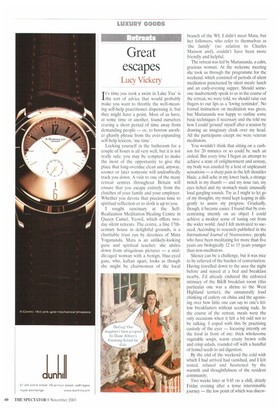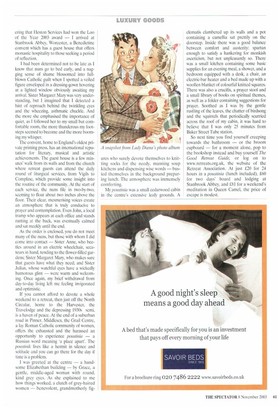Great escapes
Lucy Vickery
It's time you took a swim in Lake You' is lthe sort of advice that would probably make you want to throttle the well-meaning self-help practitioner dispensing it, but they might have a point. Most of us have, at some time or another, found ourselves craving a short period of time away from demanding people — or, to borrow another ghastly phrase from the ever-expanding self-help lexicon, 'me time'.
Locking yourself in the bathroom for a couple of hours is all very well, but it is not really safe: you may be tempted to make the most of the opportunity to give the place that long-overdue clean and, anyway, sooner or later someone will undoubtedly track you down. A visit to one of the many retreat centres throughout Britain will ensure that you escape entirely from the clutches of your family and your employer. Whether you devote that precious time to spiritual reflection or to sloth is up to you.
I sought sanctuary at the SelfRealization Meditation Healing Centre in Queen Camel, Yeovil, which offers twoday silent retreats. The centre, a fine 17thcentury house in delightful grounds, is a charitable trust run by devotees of Mata Yogananda. Mata is an unlikely-looking guru and spiritual teacher: she smiles down from ubiquitous pictures — a middle-aged woman with a benign, blue-eyed gaze, who, kaftan apart, looks as though she might be chairwoman of the local
branch of the WI. I didn't meet Mata, but her followers, who refer to themselves as 'the family' (no relation to Charles Manson and), couldn't have been more friendly and helpful.
The retreat was led by Mariananda, a calm, gracious woman. At the welcome meeting she took us through the programme for the weekend, which consisted of periods of silent meditation punctuated by silent meals: lunch and an early-evening supper. Should someone inadvertently speak to us in the course of the retreat, we were told, we should raise our fingers to our lips as a 'loving reminder'. No formal instruction on meditation was given, but Mariananda was happy to outline some basic techniques if necessary and she told me how I could 'ground' myself after a session by drawing an imaginary cloak over my head. All the participants except me were veteran meditators.
You wouldn't think that sitting on a cushion for 20 minutes or so could be such an ordeal. But every time I began an attempt to achieve a state of enlightenment and ecstasy, my body was assailed by a host of unpleasant sensations — a sharp pain in the left shoulder blade, a dull ache in my lower back, a strange twitch in my thumb — and my nose ran, my eyes itched and my stomach made unusually loud gurgling sounds. Try as I might to let go of my thoughts, my mind kept leaping in diligently to assess my progress. Gradually, though, it became easier. I found that by concentrating intently on an object I could achieve a modest sense of tuning out from the wider world. And I felt motivated to succeed. According to research published in the International Journal of Neuroscience. people who have been meditating for more than five years are biologically 12 to 15 years younger than non-meditators.
Silence can be a challenge, but it was nice to be relieved of the burden of conversation. Having travelled down to the area the night before and stayed at a bed and breakfast nearby, I'd already endured the enforced intimacy of the B&B breakfast room (this particular one was a shrine to the West Highland terrier); the unnaturally loud chinking of cutlery on china and the agonising over how little one can say to one's fellow breakfasters without seeming rude. In the course of the retreat, meals were the only occasions when it felt a bit odd not to be talking. I coped with this by practising custody of the eyes — focusing intently on the food in front of me: thick wholesome vegetable soups, warm crusty brown rolls and crisp salads, rounded off with a handful of fennel seeds to aid digestion.
By the end of the weekend the cold with which I had arrived had vanished, and I felt rested, relaxed and heartened by the warmth and thoughtfulness of the resident community.
Two weeks later at 9.45 on a chill, drizzly Friday evening after a tense interminable journey — the low point of which was discov
ering that Heston Services had won the Loo of the Year 2003 award — I arrived at Stanbrook Abbey, Worcester, a Benedictine convent which has a guest house that offers monastic hospitality to those seeking a period of reflection.
I had been determined not to be late as I know that nuns go to bed early, and a nagging sense of shame blossomed into fullblown Catholic guilt when I spotted a veiled figure enveloped in a dressing-gown hovering at a lighted window obviously awaiting my arrival. Sister Margaret Mary was very understanding, but I imagined that I detected a hint of reproach behind the twinkling eyes and the wheezing, asthmatic chuckle. And the more she emphasised the importance of quiet, as I followed her to my small but comfortable room, the more thunderous my footsteps seemed to become and the more booming my whisper.
The convent, home to England's oldest private printing press, has an international reputation for literary, musical and artistic achievements. The guest house is a few minutes' walk from its walls and from the church where retreat guests can attend the daily round of liturgical services, from Vigils to Compline, which provide some insight into the routine of the community. At the start of each service, the nuns file in two-by-two, seeming to float about two inches above the floor. Their clear, mesmerising voices create an atmosphere that is truly conducive to prayer and contemplation. Even John, a local tramp who appears at each office and stands ranting at the back, was eventually calmed and sat meekly until the end.
As the order is enclosed, you do not meet many of the nuns, but those with whom [did come into contact — Sister Anne, who beetles around in an electric wheelchair, secateurs in hand, tending to the flower-filled gardens; Sister Margaret Mary, who makes sure that guests have what they need; and Sister Julian, whose watchful eyes have a wickedly humorous glint — were warm and welcoming. Once again, my brief withdrawal from day-to-day living left me feeling invigorated and optimistic.
If you cannot afford to devote a whole weekend to a retreat, then just off the North Circular, home to the Harvester, the Travelodge and the depressing 1930s semi, is a haven of peace. At the end of a suburban road in Pinner. Middlesex, the Grail Centre, a lay Roman Catholic community of women, offers the exhausted and the harassed an opportunity to experience poustinia — Russian word meaning 'a place apart'. The poustinik lives like a hermit in silence and solitude and you can go there for the day if time is a problem.
I was greeted at the centre — a handsome Elizabethan building — by Grace, a gentle, middle-aged woman with round, kind grey eyes. As she explained to me how things worked, a clutch of grey-haired women — benevolent, grandmotherly fig ures who surely devote themselves to knitting socks for the needy, manning soup kitchens and dispensing wise words — busied themselves in the background preparing lunch. The atmosphere was immensely comforting.
My poustinia was a small cedarwood cabin in the centre's extensive leafy grounds. A
clematis clambered up its walls and a pot containing a camellia sat prettily on the doorstep. Inside there was a good balance between comfort and austerity: spartan enough to satisfy a hankering for monkish asceticism, but not unpleasantly so. There was a small kitchen containing some basic supplies for an evening meal, a shower, and a bedroom equipped with a desk, a chair, an electric-bar heater and a bed made up with a woollen blanket of colourful knitted squares. There was also a crucifix, a prayer stool and a small library of books on spiritual themes, as well as a folder containing suggestions for prayer. Soothed as I was by the gentle rustling of the leaves, the chatter of birdsong and the squirrels that periodically scurried across the roof of my cabin, it was hard to believe that I was only 25 minutes from Baker Street Tube station.
So next time you find yourself creeping towards the bathroom — or the broom cupboard — for a moment alone, pop to the bookshop instead and buy yourself The Good Retreat Guide, or log on to www.retreats.org.uk, the website of the Retreat Association. At just £20 for 24 hours in a poustinia (lunch included), £60 for two days' board and lodging at • Stanbrook Abbey, and £81 for a weekend's meditation in Queen Camel, the price of escape is modest.



































































































 Previous page
Previous page